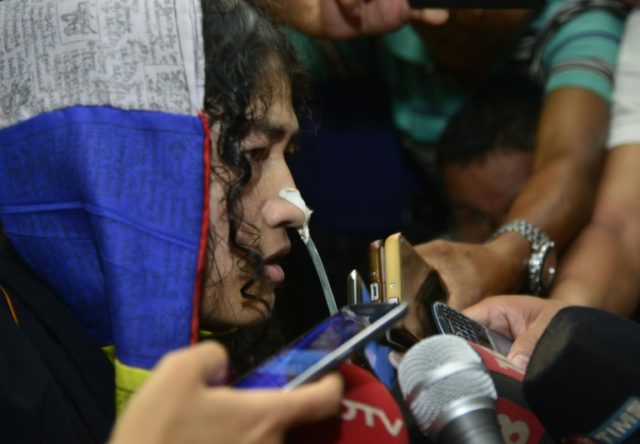Guwahati (India) (AFP) – An Indian rights activist who has waged what is thought to be the world’s longest hunger strike ended her 16-year fast on Tuesday after vowing to continue her struggle by standing for election in her home state.
Irom Sharmila, dubbed the “Iron Lady of Manipur” for her protest against alleged rights abuses by security forces in the northeast Indian state, wept as she removed the tubes that were used to force-feed her from her nose and consumed a vial of honey.
The 44-year-old had been held in judicial custody on charges of attempting suicide — still a criminal offence in India — and confined to a hospital where she was fed through a nasal tube.
She was released from custody on Tuesday after she promised a court she would end her fast and submitted bail of 10,000 rupees ($150).
Shortly afterwards she held an impromptu press conference inside the hospital, where she announced her ambition to be the next chief minister of Manipur.
“I know nothing about politics and academically my education is very, very low, but I want to convince our people,” she said in halting English.
“I will use everything I have for the positive change of the society.”
Irom, who had earlier announced her intention to stand as an independent candidate in next year’s state elections, said her first act if she won power would be to repeal the “draconian” Armed Forces Special Powers Act (AFSPA).
The act, which covers large parts of the northeast and the restive state of Kashmir, gives Indian forces sweeping powers to search, enter property and shoot on sight, and has been criticised as a cover for human rights abuses.
The Indian government says security forces need the powers to help them battle multiple rebel groups whose long-standing demands range from secession to greater autonomy and land rights.
After emerging from court, Irom said her long campaign of fasting had not worked and she wanted to try a new way.
“I went on a fast for about 16 years thinking I could change the system, but I now realise that this will not yield any result,” she said.
– Frail but determined –
Amnesty International India campaigner Abhirr VP called Irom’s hunger strike “a testament to her passion for human rights, and her belief that a draconian law like the AFSPA has no place in any society”.
Irom began her fast on November 2, 2000 after allegedly witnessing the killing of 10 people by the army at a bus stop near her home.
Two weeks ago she surprised supporters by declaring she would end it to stand as an independent candidate in state elections to be held next year.
“My fight so far has been all alone and so I have decided to wage a war against the (AFSPA) act democratically by becoming a lawmaker instead of continuing with my fast,” she told reporters at the time.
On Tuesday she appeared frail but determined as she spoke to reporters after the hearing.
It is not clear whether she will return to the family home — she has said she would like to marry her fiance, a British national of Indian origin who she met after starting her fast.
Doctors have said she will need medical help to begin eating again.
Amnesty International declared her a Prisoner of Conscience in 2013 and she has received several prestigious international prizes, including a lifetime achievement award from the Asian Human Rights Commission.
But support in Manipur has waned in recent years and she has even faced death threats over her plans to marry someone from outside her home state.
Asked about the threats on Tuesday, Irom said she was saddened but undaunted.
“People can’t be convinced right now, but if they really don’t want to be convinced, let them kill me,” she said.

COMMENTS
Please let us know if you're having issues with commenting.